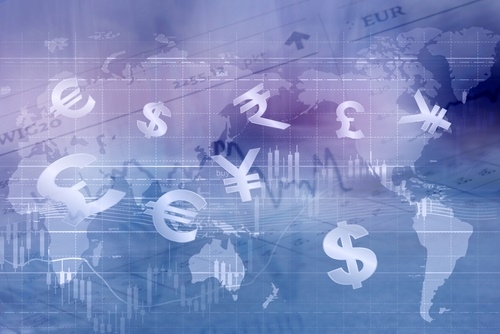
By Gareth Vaughan
Although trading in foreign exchange markets is inherently very risky, the Reserve Bank (RBNZ) boosting its capacity to do so makes sense both from monetary policy and financial stability perspectives, Westpac New Zealand Chief Economist Kelly Eckhold says.
Speaking in in the latest episode of interest.co.nz's Of Interest podcast, Eckhold who formerly worked as the RBNZ's manager of foreign reserves and at the International Monetary Fund, says the RBNZ's foreign currency intervention capacity is likely to increase significantly over the next two or three years from the NZ$17.725 billion as of its latest disclosure.
That's even after the RBNZ in July ramped up its foreign currency intervention capacity by almost NZ$4 billion by creating and selling NZ dollars. This followed January's announcement of its new Foreign Reserves Management and Co-ordination Framework (FRCF).
Eckhold points out the RBNZ's total level of foreign reserves hadn't changed substantively since 2008, and the economy's about 80% bigger now and the foreign exchange market has probably doubled in size. The RBNZ has intervened in currency markets sparingly in the past, and the new FRCF doesn't mean this will change.
"When you see this rather large and abrupt change in the level of reserves going on here it's a consequence of the fact that the framework hasn't been reviewed for a very long time," Eckhold says.
"We have a well functioning foreign exchange market. The purpose of having the intervention policy for crisis situations is to keep it that way at all times," he says.
From a monetary policy perspective the RBNZ may intervene when the NZ dollar "overshoots or undershoots relative to its justified or fundamental levels." It's a tool available to "lean against some of those really large unjustified deviations in the exchange rate."
"With respect to the crisis intervention role, what it really does is help provide a bit of insurance in the event that some relatively rare but bad situations occur. And one of the good things about insurance is that it makes people probably a little bit more comfortable investing in the country because they feel there's some buffers there that could be used if something bad happens. That probably means all else equal your interest rate's a little bit lower, potentially your exchange rate could be a little bit less volatile, and that's going to be to the benefit of ordinary New Zealanders and firms," says Eckhold.
"For the monetary policy intervention operation to the extent they have some success in helping moderate the cycle, then that would help contribute to reduced instability in output, inflation, [and] the exchange rate itself. And that's also going to be of benefit to everybody over time."
"I calculated the total government foreign exchange reserves at [the equivalent of] about 7% [of] GDP. So we're not talking about something that's going to break the bank here."
In the podcast Eckhold also talks about how and where the RBNZ holds its foreign currency reserves, how much bigger the holding might get, the circumstances under which the RBNZ may intervene, the RBNZ's intervention track record, its hedged and unhedged foreign reserves, and more.
The new FRCF will be reviewed every five years.
*You can find all episodes of the Of Interest podcast here.

16 Comments
The NZ currency rose in mid July to 64USD. Then the RBNZ must have started selling NZD as its largely been down ever since. A lower dollar doesn't help when fighting inflation
The RBNZ’S published F5 table https://www.rbnz.govt.nz/statistics/series/reserve-bank/our-foreign-cur… (link to it) shows they lifted their reserves in July close to NZD4bio and have done nothing since. To think the RBNZ controls the level of the NZD is on a par with thinking Luxton controls the current Government negotiations. There are so many more factors in play with the NZD moves and most of them are global or NZ’s relative performance to the world so I would not bank on the RBNZ’S ability to stabilise the NZD in times of turmoil
" There are so many more factors in play with the NZD moves and most of them are global or NZ’s relative performance to the world"
And speculation.
NZ provides around 0.2% of world exports but curiously is the 14th most traded currency with a use 10 times greater than expected.
Ah-yes - the Carry Trade. This has given our currency a wild ride before.
Isn't this just making more inflation exactly when we don't need it? Do they have to kick us while we're down?
It's timely the RBNZ builds reserves to protect our currency should it be dumped. This building of reserves should be interpreted as a clear signal to prepare for tougher times. We are a heavily indebted nation who sells overpriced houses to each other and yet we call it prosperity. Our current account signals otherwise.
Houses are overpriced and not a good investment. But you are hanging on to yours.
Flying High, I have no problem whatsoever with "flat earth believers", regurgitating my views in ways that only suit their agenda - none whatsoever. It speaks more of their state of mind - than mine. Different people will always interpret the same comments I make in many different ways.
Ee Ee Ee Ee
The sound made as retired poppy wheels the spotlight to face the other way whilst evading the obvious flaw
Case in point - Flat Earth Society it is. I'm sure for you membership has its rewards :)
Foreign currency interventions are a great way for currency traders to make money out of tax payers. Ask George Soros.
Vis a vis JK
The Lange government denied they would devalue but in the process signalled that's what they were about to do. Back before a floating currency
I doubt that Kelly and I would agree on much, but he knows his onions on fx.
What he doesn't say as clearly as he might is that the relative strength of the NZD has almost nothing to do with what we buy or sell. In cold, hard, trade terms, we are more like a developing country - we export mostly low value primary goods, but import value-added goods like processed foods, refined fuel, and technology.
What supports the strength of the NZD is the confidence of investors in the stability of the NZ Govt and RBNZ. If an investor buys a NZ Govt bond they know that they will get the stated return (the coupon payment) and that the final settlement will be made. This confidence makes our bonds highly tradable.
This is critically important for NZ because we run a big trade deficit and we balance this deficit by 'exporting' Govt bonds and other financial assets. Over the last couple of years, Govt bonds have been our biggest export and overseas ownership of bonds has hit record levels (around $80bn from memory - that's 20% of GDP).
Now, if RBNZ drop interest rates because the economy is tanking, what happens? This is the scenario that RBNZ are planning for. They need enough fx in the bank to be able to counter a run. Maybe we'll find out if they prepared.
They need enough fx in the bank to be able to counter a run.
Run of what? If it's bond sellof RBNZ can buy them right? Why do they need forex ??
Or bond sell off means more settlement balance And this forex reserve is to protect run on settlement balance?
"Run of what?"
If large holders of the NZ currency choose to sell them for other foreign currencies (such as USD, AUD, etc), then the NZD exchange rate is likely to fall.

We welcome your comments below. If you are not already registered, please register to comment
Remember we welcome robust, respectful and insightful debate. We don't welcome abusive or defamatory comments and will de-register those repeatedly making such comments. Our current comment policy is here.